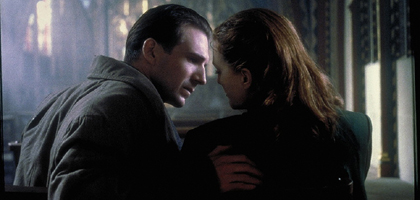
The spider in the church
Film of the Month: The End of the Affair

Neil Jordan's The End of the Affair has fine performances, yet the most important jealous lover in Graham Greene's original novel - God - is all but left out, argues Philip Kemp.
Should a film adapted from a novel (or play, or whatever) be judged purely on its merits as a film, without reference to its source material? Ideally, perhaps, yes. Yet when a film turns out as bland as Neil Jordan's The End of the Affair, despite its writer-director's evidently sincere admiration for Graham Greene's novel, it surely makes sense to invoke the original in trying to work out what went so wrong.
It's not just a matter of cinematic prettification, though that enters into it. In a crucial scene in the novel the two former adulterous lovers, Maurice Bendrix (played by Ralph Fiennes in the film) and Sarah Miles (Julianne Moore), meet in a church. It's cold and dark and comfortless. There's a "hideous statue of the virgin," writes Greene. In the film, the church has become spacious and opulent. The draperies are bright with blue and crimson, the rood screen a glowing expanse of gold. Hazy sunlight streams through the stained glass. This is symptomatic: an awkward, edgy, tormented novel has been upholstered for comfort. Unexpectedly, Edward Dmytryk's plodding 1954 black-and-white version, starring a badly miscast Van Johnson opposite Deborah Kerr, gets closer to the visual feel of it.
But the problem goes deeper than that. The key character in Greene's novel is a jealous, possessive lover. He's devious, underhand and calculating; he lies in wait, takes unfair advantage; he'll pull every trick in the book to prevent the woman he wants from succumbing to a rival. If necessary, he'll even kill her. This schemer isn't the writer Bendrix (a semi-autobiographical portrait by Greene), but Greene's personal and highly unorthodox version of the Roman Catholic God - a character who in Jordan's film has been marginalised, in places almost written out. Much of the power of the novel lies in the sense of God's trap closing inexorably, of every potential exit being quietly shut off as soon as glimpsed. In the film the trap is sprung open and the mice are out cavorting.
The central turning point, in the film as in the novel, is when Maurice reads Sarah's journal and discovers why she ended their affair so abruptly. He imagined she'd tired of him and, since her marriage to dull civil servant Henry (Stephen Rea) was a sexless shell, found herself another man. Instead it turns out she believed him killed by a flying bomb and, praying desperately, offered God a swap: bring him back to life and I'll give him up for ever. It's left ambiguous whether Maurice was really dead, or simply unconscious; but the vow is absolute. Greene's petty-minded version of the Deity sees to that. Each time either Maurice or Sarah tries to break the promise, God the supreme chessmaster moves deftly to block them. The lovers are kept apart until Sarah's death. Thereby, Greene implies, her soul is saved for the Church and she even becomes a miracle-working saint.
Whatever you think of this as theology - and many people, believers and non-believers, have found it pretty repellent - it does at least give the story a consistent raison d'être. But Jordan's film blows it wide open. A few changes apart, he stays reasonably close to the original until the reading of the journal. He even preserves one of Greene's most Hardyesque ironies, when Maurice's own schemes are turned against him: Sarah, her resistance worn down, is packing to leave her husband at the very time when Maurice confronts Henry with (as he thinks) evidence of her affair with another man. Broken, Henry comes home and implores Sarah not to desert him, and she stays.
All this goes for nothing in the second half of the film. Having read the journal, Maurice rushes to Sarah. She resists briefly, then succumbs and they fall into bed together. Next we find them jaunting off for a dirty weekend in Brighton, where Henry bizarrely pops up to catch them together in the Pavilion. With this episode the whole fabric of the film coarsens: we even get a clichéd shot of the grinning couple whirled around together at a fun fair. Perhaps Jordan fears modern audiences will find the concept of voluntary chastity incomprehensible, but these tinkerings make nonsense of everything that's gone before. What matters isn't that his film is not true to the book - no reason why a film should have to be, after all - but that the film isn't true to itself.
One or two other changes seem ill thought-out. The facial strawberry birthmark that in the novel afflicts a different character is transferred to Lance, the son of the private detective Parkis (Ian Hart) Maurice hires to spy on Sarah. Since Parkis takes the boy (Samuel Bould) with him in his work, where his aim is to stay inconspicuous, this makes him not simply a pitiable figure but an incompetent fool. And it's scarcely credible that in 1946 an ultra-respectable senior civil servant like Henry would invite his wife's lover to join in a ménage â trois, even if the wife was dying. (In the novel Maurice moves in after Sarah's death, which today might raise eyebrows for a different reason. Still, the love tangle from Greene's own life was bizarre enough by some accounts: Harry Walston, the husband of Greene's lover Catherine Walston, and Greene's wife Vivien both knew of and tactitly condoned the lovers' affair.)
It would be unjust to imply that The End of the Affair is some kind of write-off. In the first half of the film Jordan skilfully sustains his three-way time scheme, switching from post-war to pre-war to wartime with deft visual economy and no loss of narrative clarity. At times, too, the performances all but carry it. Ralph Fiennes, fresh from Onegin, has perhaps played too many guilt-stricken lovers just recently; but Stephen Rea, with his doleful jowls, makes an ideal Henry, and Julianne Moore gives a vibrantly sensual performance, movingly convincing as a woman so selflsess in her passion she would make the agonising bargain to have her lover alive even if forever unattainable.
But nothing can overcome the gap at the heart of the film. The story, Jordan has been quoted as saying, "is about the question of how far love goes between people. If somebody says, 'I will love you forever,' do you know how far they will carry that promise through?" At best, this is an oversimplification, at worst a total misreading. The story, at least as Greene conceived it, is about religion, seen not as a solace but as an affliction, presided over by a Deity who, for all Greene's Catholicism, has a lot in common with the grim Lutheran God of Ingmar Bergman: the malignant spider on the wall, watching and spinning his web. There's little place for such an implacable being in the comfortable, sunlit church of Jordan's film.
